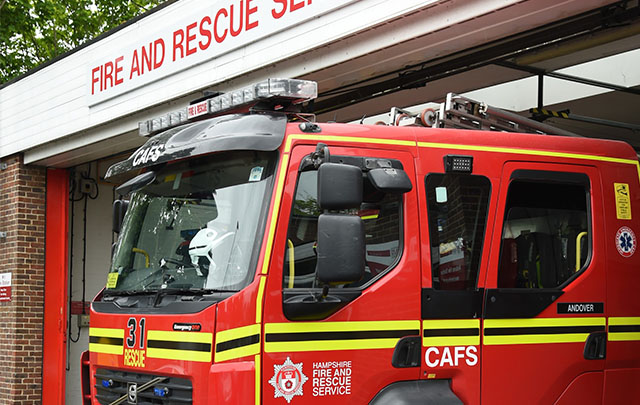Stephanie Howe talks to Arron Hedges, Head of Property & Facilities at Hampshire Fire & Rescue Service, about leading a front line estate portfolio through a pandemic, making the move from the private to public sector and the continued opportunity for collaboration and partnership across the Estate going forward.
After a year in post as Head of Property & Facilities at Hampshire Fire & Rescue Service what have been your biggest challenges and successes in leading the Service’s estate portfolio?
Joining a Local Authority from the private sector was always going to be a big change, however I had previous experience in the public sector to draw upon. What I couldn’t have expected was the impact of Covid-19. The way the Organisation was working and utilising the estate was not set up for social distancing, so my teams reaction to lockdown and government restrictions had to be quick to ensure our operational crews were not put at risk and response times were maintained. Balancing this additional workload with business as usual (BAU) was the top priority.
The biggest success was the response from my team to the fast paced change of Covid. Risk assessments, business continuity plans were all reviewed and in place, contractors such as cleaning providers were signed up to deep clean response times within affordable costs. I felt my team reassured the Service that we were in control and could be relied upon as subject matter experts. It was a real pleasure hearing in strategic coordinating meetings that the teams efforts are being praised for the work they have completed.
Following a return to the public sector, after 6 years in private sector real estate consultancies, what have you found to be biggest differences in working environments and styles?
The biggest change was moving from contractor to client side, I enjoyed delivering contracted services to large blue-chip firms. However, HFRS had a clear estates strategy and I felt I could have significant impact in the role. Upon making that step I quickly realised my skills were very strong in delivery and that I needed to adjust to strategic long-term thinking.
The age of the estate, like most public authorities is aging, so a clear pipeline of capital improvement works is required. Questions like ‘how do we fund a multimillion pound programme of new fire stations’? Understanding governance was key to ensuring we could deliver on the strategic objectives but are also held accountable for our actions and spending.
2020 has been an exceptional year – how have you and your teams adapted during the pandemic to support front line services?
2020 has thrown in a few curve balls, however, I can’t express enough how important maintaining our BAU activities was, in particular our statutory compliance. Although our main headquarters may have seen a drop in occupation, our operational stations remained open and fully operational.
My team adapted quickly to the change by utilising technology such as Office 365, ensuring risk assessments had been ‘Covid’ reviewed and that our building works would not put the operational crews at risk. It was a real challenge to keep compliance at the level we did, whilst minimising exposure to the crews. We achieved this by ensuring robust risk assessments were in place, communication with operational teams and only essential works to be carried out.
What are the key lessons that you have personally learned from operating through a pandemic?
There are many lessons learned over the last 12 months, but I would have to say that most importantly is to realise and accept you can’t plan for everything and sometimes you just have to be good at reacting in a positive manner.
Secondly, ensuring those continuing to deliver BAU activities are praised and rewarded as much as those who are responding and delivering actions to an emergency coordinating group. When I look back, my team all wanted to help with the Covid response, however that just wasn’t practical as our BAU activities needed to continue. Without the team players that kept the BAU activities going, we wouldn’t be in the position we are now.
What do you foresee to be the greatest opportunities for HFRS and its neighbouring public sector partner organisations to continue to collaborate in order to achieve shared estate related objectives?
As a person that worked in local government during the 2008 financial crisis, it’s critical we align our thinking with local partners to ensure economies of scale and a full utilisation of our estates.
Colocation is a key area for greater savings and collaborative working. We have great relationships with our partners and I’m keen to champion this mindset during my time as Head of Property & Facilities. The greater the collaboration, the greater the potential savings can be both financially and through shared resources.
Do you see opportunity for the public and private sectors to work in partnership more closely in the future in relation to development of land and property and ongoing asset utilisation?
I believe there is already a good mix within private/ public sector working. However as we come out the other side of Covid, public sectors will need to explore alternative opportunities to remain financially secure.
The private sector will be a key resource for our industry to adjust to the changing demands, just as we did back in 2008.
